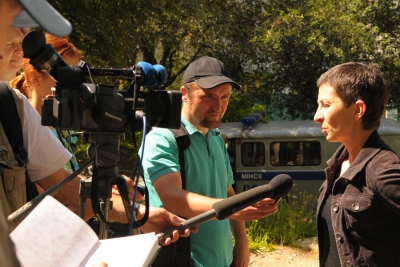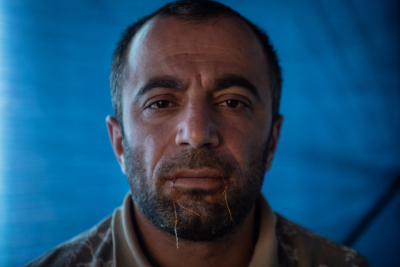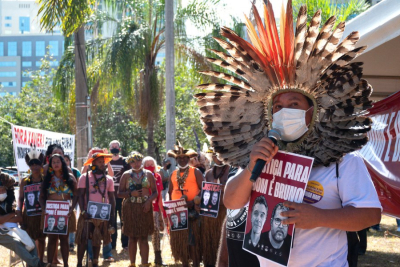Government against antinuclear activists in Belarus
The Belarusian nuclear power plant near Ostrovets, located about 20 km from the Lithuanian border and 50 km from its capital, Vilnius, raises a lot of concern on the part of the public and experts because of its numerous technical violations and breaches of legislation as well as of human rights during its construction. In particular, the excavation for the reactor building has been started without a project license or state expertise. Andrey, Tatyana, and other activists and organizations wanted to tell the Russian Prime Minister about these issues when he came to Minsk to sign the credit agreement for the Ostrovets nuclear power plant and request him to step down from the project. Critics have also mentioned that the project strengthens the dependence of Belarus on the Russian Federation.
Citizens against the construction. |
A strong opposition has been formulated among citizens and experts, but it is hard to be an environmental activist in Belarus. Since the beginning of the antinuclear campaign, the people involved have been experiencing oppression by governmental institutions.
The history of the Belarusian anti-nuclear campaign activists started in 2008 when President Lukashenko adopted the "final political decision on the construction of a nuclear power plant (NPP)." The Government used its traditional methods, from administrative persecution (arrests, searches, and deportations) to intimidation. This pressure was targeted against peaceful activists, including the experts who pointed out the poor quality of official documentation, such as the lack of an environmental impact assessment.
Locals in the Sights
The Belarusian town of Ostrovets was chosen as the best place for the construction of a nuclear power plant and was selected in violation of the law, and without consultation with citizens or neighbors. In 2008, the activists from the local campaign "The Island of Nuclear Power Plant is a Crime" handed about 300 signatures to President Lukashenko, calling him to the site. The independent mass media began reporting on the brave locals, which marked the beginning of their persecution by the government; campaign organizers Nikolay Ulasevich and Ivan Kruk suffered from organized provocation, including being searched, fined, and detained. Other activists were also localized by local authorities who demanded that they stop campaigning.
Violating public order
On October 9, 2009, Russian nuclear expert Andrey Ozharovskiy was arrested and held for seven days in the Belarusian town of Ostrovets on hooliganism charges. It was on the day of public hearing on Environmental Impact Assessment (EIA) of the Belarusian nuclear power plant project. Andrey was invited to the NGO Ecohome as an expert critic of the official environmental impact assessment, and was also an official registered participant in that hearing. Nevertheless, he was detained by secret service officers on his way to hearing. They handed him over to the police, who also seized his documents.
Later in 2012, Tatyana Novikova, and journalist and coordinator of the Belarusian anti-nuclear campaign, the Russian embassy in Minsk together with Andrey Ozharovskiy. Russian Prime Minister Dmitry Medvedev said the Russian Prime Minister was about to open the letter to the Russian Prime Minister. billion US dollars.
They were both detained by the police before they reached their destination. Their alleged offense was the violation of public order by using brutal language on the street
As a result, the district court sentenced Tatyana Novikova to five days in prison and Andrey Ozharovskiy to 10, but on top of that, the police banned Ozharovskiy from entering Belarus within the next 10 years and he was deported.
Their colleagues, Ecohome member Mihail Matskevich (who was planning to help to open the letter to the Russian embassy) and Mihail Matskevich (who wanted to help them), were also on the same day, July 18, 2012 the offices of the Green Network and charged with hooliganism. Irina was fined and Mihail arrested.
Preventive arbitrary detentions
On April 26, 2013, a group of environmental activists from the Ecohome NGO were collecting banners in the flat of the organization's founder, Irina Sukhy. Tatyana Novikova was among them. They were just planning to leave the flat and start the traditional Chernobyl March, organized annually in Minsk to remember the sad anniversary.
Suddenly, police officers dressed in civilian clothes appeared, leaving the people who were coming out of the flat, and detained them for several hours. Tatyana was, on the other hand, blocked in the flat by the police for another three hours. She was authorized as an organizer of the Chernobyl March by an official application for permission to organize such a public event. The detained activists were released from the police station at 9 pm, when the march was already over.
It is common practice for police officers in Belarus to detain activists in order to prevent them from participating in street events or other planned activities. They call it preventive detention.
Although the Belarusian anti-nuclear campaign still continues, the Ostrovets power plant is under construction, the entire case is open-ended so far… (Russian only) and the Facebook page of the Antinuclear Campaign - https://www.facebook.com/antinuclear.belarus/
Further readings
RUS 07/05/2013 Human Rights Situation in Belarus. April 2013 (Viasna)
RUS 2013 What is not allowed is forbidden. Civil community in Belrus is forced to silence (Amnesty International)
ENG 24/07/2017 Findings and recommendations with regard to communication ACCC/C/2014/102 concerning compliance by Belarus (Economic Commission for Europe)





